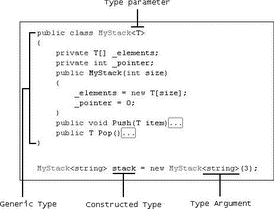Книга: C# 2008 Programmer
Generic Classes
Generic Classes
Using generics, you do not need to fix the data type of the items used by your stack class. Instead, you use a generic type parameter (<T>) that identifies the data type parameter on a class, structure, interface, delegate, or procedure. Here's a rewrite of the MyStack class that shows the use of generics:
public class MyStack<T> {
private T[] _elements;
private int _pointer;
public MyStack(int size) {
_elements = new T[size];
_pointer = 0;
}
public void Push(T item) {
if (_pointer > _elements.Length - 1) {
throw new Exception("Stack is full.");
}
_elements[_pointer] = item;
_pointer++;
}
public T Pop() {
_pointer--;
if (_pointer < 0) {
throw new Exception("Stack is empty.");
}
return _elements[_pointer];
}
}
As highlighted, you use the type T as a placeholder for the eventual data type that you want to use for the class. In other words, during the design stage of this class, you do not specify the actual data type that the MyStack class will deal with. The MyStack class is now known as a generic type.
When declaring the private member array _element, you use the generic parameter T instead of a specific type such as int or string:
private T[] _elements;
In short, you replace all specific data types with the generic parameter T.
You can use any variable name you want to represent the generic parameter. T is chosen as the generic parameter for illustration purposes.
If you want the MyStack class to manipulate items of type int, specify that during the instantiation stage (int is called the type argument):
MyStack<int> stack = new MyStack<int>(3);
The stack object is now known as a constructed type, and you can use the MyStack class normally:
stack.Push(1);
stack.Push(2);
stack.Push(3);
A constructed type is a generic type with at least one type argument.
In Figure 9-1 IntelliSense shows that the Push() method now accepts arguments of type int.

Figure 9-1
Trying to push a string value into the stack like this:
stack.Push("A"); //---Error---
generates a compile-time error. That's because the compiler checks the data type used by the MyStack class during compile time. This is one of the key advantages of using generics in C#.
To use the MyStack class for String data types, you simply do this:
MyStack<string> stack = new MyStack<string>(3);
stack.Push("A");
stack.Push("B");
stack.Push("C");
Figure 9-2 summarizes the terms used in a generic type.

Figure 9-2
- Classes
- Understanding Generics
- Advantages of Generics
- Generic Interfaces
- Generic Structs
- Generic Methods
- Generic Delegates
- Generics and the .NET Framework Class Library
- 16. Object Reorientation: Generic Functions
- 17. Object Reorientation: Classes
- Generic Functions and Classes
- SCTP Generic header format




